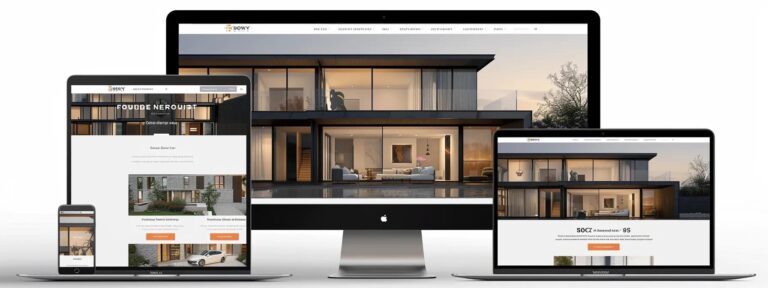Heads Up: When you purchase through links on our site, we may earn an affiliate commission at no cost to you.
Are you challenged by creating a realtor site that truly reflects your business? This post shows you how to define your target audience and choose a domain name that mirrors your brand. You will also find clear steps to design an engaging homepage and implement SEO strategies to increase your site‘s visibility. If you find it hard to attract potential clients, this article offers practical tips to help you build your ideal realtor site from scratch today.
Key Takeaways
- Assess market demographics and client needs to inform the design of an effective website.
- Use analytics and feedback to refine the layout and boost user engagement.
- Choose a local domain to build trust and improve brand visibility.
- Integrate MLS for clear property information and enhanced user interaction.
- Apply targeted keyword research and an organized structure to raise search ranking.
Define Your Target Audience for Your Realtor Site

Focus on identifying market demographics and understanding client needs. Use insights from the National Association of Realtors, explore effective page layouts and templates in WordPress, and consider podcast tools to connect with your audience. These steps help you define your target audience while tailoring your realtor site to meet their specific interests.
Identify Market Demographics
You start by evaluating consumer data using analytics to identify key market segments and track buyer trends. You review potential clients’ data on budget limits and sales patterns to shape the design of your website builder platform and boost your credibility:
| Factor | Metric | Insight |
|---|---|---|
| Budget | Spending range | Price sensitivity |
| Sales | Purchase frequency | Demand trends |
| Credibility | Client feedback | Reputation impact |
You use these clear insights to adjust your site layout and features, ensuring your platform speaks directly to your audience. This focused approach supports your goal of boosting sales and instilling trust in your online presence.
Understand Client Needs and Preferences
You assess each client’s needs by examining how visitors interact with your site and landing page. Incorporating practical CSS tweaks and thorough user experience analysis can guide your strategy in refining customer service and overall functionality:
- Analyze user behavior on the landing page
- Integrate targeted CSS improvements
- Collect insights from direct client feedback
You respond to client input by adjusting design elements to meet their preferences and enhance engagement. Applying your practical experience leads you to optimize both the site interface and customer service approach for a smoother user experience.
- Instant feedback
- Valuable insights
- Actionable tips
Choose a Domain Name That Reflects Your Brand

You gain trust by selecting a domain name that truly reflects your brand. You explore tips for a memorable domain that improves search engine optimization while using a local domain extension. You also learn how a content management system supports interior design and web service features to strengthen your image as a real estate agent.
Tips for Selecting a Memorable Domain
You focus on a domain name that summarizes your brand and appeals directly to your target audience. You aim for a name that not only aligns with your marketing strategy but also stands out when potential clients use search engines and navigate through various website templates:
- Identify your target customer from the outset.
- Select a concise name that resonates with your business values.
- Collaborate with a web developer to verify that it functions well across diverse websites.
- Ensure the domain name supports your overall marketing strategy.
- Ensure it reflects the level of professionalism expected by visitors.
You then refine your choices with the help of your web developer, testing how each option scales on different website templates and integrates with your digital marketing strategy. This practical approach enhances your search engine ranking and confirms that your domain name effectively addresses the needs of your target audience.
Importance of a Local Domain Extension
You increase brand awareness when you opt for a local domain extension, which signals to potential clients that your website speaks directly to their area. As a broker, you use this approach to highlight your expertise on real estate websites and offer a clear menu for visitors to navigate your services.
You build credibility by choosing a local domain extension that aligns with your target clients’ expectations. This method helps you connect locally as a broker, improve brand awareness on real estate websites, and deliver a smooth website experience through an intuitive menu system.
Select a Reliable Hosting Provider

Consider factors such as feedback, cost, resource allocation, image, and template performance when selecting your hosting provider. Compare plans to find the option that strikes a balance between efficiency and a strong online presence. This section details each factor to ensure your realtor site builds a solid foundation while meeting your specific needs.
Factors to Consider When Choosing Hosting
You should assess hosting plans that integrate well with your web design framework and support your site‘s construction process. Search for services that incorporate advanced tools such as artificial intelligence to boost performance, and work with a skilled developer who understands how a reliable host can benefit a real estate firm.
You need a provider that offers robust security, scalability, and responsive support to keep your site running smoothly. Opt for a hosting partner that recognizes the technical needs of your real estate firm and uses innovative methods to maintain a strong online presence while supporting your web design and construction efforts.
Compare Different Hosting Plans
You compare various hosting plans by examining features such as management support and premium service offerings, enabling you to choose a partner that matches your real estate firm’s needs. You may find a valuable testimonial on a provider’s site that acts as a resource, reinforcing your confidence in your chosen option while strengthening your brand image.
You evaluate plans based on factors such as scalability and efficient resource allocation, ensuring each option meets your practical needs. You consider providers offering management services with reliable performance, backed by a testimonial that highlights their commitment to a premium experience for your realtor site.
Design an Engaging Homepage

You create your ideal homepage by focusing on essential elements such as strong visuals and clear messaging. You back each decision with accurate data from the real estate market and digital marketing insights that real estate agents rely on, as noted by NAR. This section offers practical strategies for designing a homepage that truly resonates with your audience.
Elements of an Effective Homepage
You build a professional website for your agency by focusing on clean design and precise messaging. You use a robust cms along with content management practices to ensure your realtor website speaks clearly to potential clients; consider including the following elements in your design:
- Clear headline with concise messaging
- User-friendly navigation menus
- Responsive layout for mobile devices
- Integrated cms tools for quick updates
You implement these design elements with practical steps that address your day-to-day challenges and help you convert visitors into leads. You refine each aspect based on feedback and analytics to maintain a trustworthy online presence for your agency.
Utilizing Strong Visuals and Clear Messaging
You capture attention by showcasing striking visuals paired with straightforward headlines that speak to your audience. High-quality images enhance your site‘s visibility and resonate with real estate professionals, ultimately attracting interest from reputable real estate agencies.
You convey your message through clear, concise text that directly addresses the client’s needs. This approach encourages engagement through social media channels and builds a robust database of prospects eager to connect with trusted real estate solutions.
Incorporate MLS Listings for Better Engagement

You gain value by incorporating MLS listings that boost client engagement on your real estate site. You learn about the benefits of MLS integration and how to choose an MLS service that fits your business needs, verifies your license, and secures your email address—all critical for a smart investment in growth.
Benefits of MLS Integration
You experience a boost in engagement when you integrate MLS listings, as current property details help capture attention and enhance your site‘s design. This approach streamlines the display of price and location information on your URL, making your listings more appealing to potential clients.
You benefit from real-time updates that improve the overall user experience, ensuring your website remains relevant and well-structured. Using MLS integration, you provide clear and concise property details that drive attention while reinforcing your site‘s design and competitive price displays.
How to Choose an MLS Service
You assess MLS service providers by reviewing the quality of property information they provide and confirming that they integrate well with your customer relationship management system. You compare service options based on how they support lead generation and benefit your company’s online presence:
- Identify providers with clear, accurate information
- Examine customer relationship management compatibility
- Evaluate features that boost lead generation
- Review user feedback on property data reliability
- Confirm the service aligns with your company’s goals
You verify MLS options based on actionable insights and practical examples shared by industry experts. You weigh each service’s benefits to guide your decision, ensuring your website supports a seamless integration of property details and client communication.
Create Dedicated Property Listing Pages

Upgrade your real estate website by creating dedicated property listing pages that follow best practices for property descriptions and highlight high-quality imagery. You will see how an estate agent tailors content to target audience behavior and offers a virtual tour to boost interest and engagement.
Best Practices for Property Descriptions
You write your property descriptions with a clear focus on your target market, ensuring that every detail resonates with potential buyers. You incorporate relevant statistics to support pricing and market trends while utilizing builder insights to enhance your approach with modern technology and proven leadership strategies.
You refine your content by connecting directly with your audience and addressing their key concerns through straightforward language. You rely on reliable statistics and builder experience to highlight technology trends and market leadership, ultimately positioning your property listings as a trusted resource for informed decisions.
Importance of High-Quality Images
You boost your site‘s appeal with clear, high-quality visuals that catch your customer‘s eye and build trust in your real estate company. You rely on these images to support your advertising efforts and deliver a smooth workflow that highlights property details, including key aspects noted during a home inspection.
You use crisp visuals to set your property listings apart, ensuring each shot meets the high standards your customers expect. You maintain an efficient workflow that reinforces your real estate company‘s reputation while strengthening your advertising strategy and presenting properties at their best.
Establish a Blog for Buyer and Seller Insights

You build a blog that covers topics important to both buyers and sellers, such as mortgage tips and market knowledge. You optimize posts for SEO by selecting a strong domain and using the right tool, ensuring your domain name strategy aligns with your audience’s needs. This method sets a clear direction for detailed insights ahead.
Topics to Cover for Your Audience
You cover topics that address current market trends, financing options, and the impact of online advertising on property sales, offering practical insights that resonate with both buyers and sellers. You demonstrate real-world marketing strategies and share your expertise as a real estate professional, encouraging readers to apply proven methods and explore tools like Squarespace to boost their online presence.
You write about significant issues such as effective pricing strategies, neighborhood insights, and digital trends that drive real estate growth, positioning your blog as a trusted resource. You utilize your expert knowledge to discuss marketing tactics and online advertising techniques, ensuring your content remains valuable and actionable for readers seeking to refine their approach as dedicated real estate professionals.
Optimizing Blog Posts for SEO
You optimize your blog posts by carefully structuring content that addresses buyer and seller insights while ensuring each piece speaks directly to your target audience. You use a blend of real examples from your real estate agency and detailed PDF case studies to illustrate trends, combine this with email marketing tactics, and make sure every user finds valuable, real information.
You refine your SEO strategy by selecting precise keywords and crafting content that meets the needs of a real audience. You apply practical tips that integrate PDF resources and email marketing strategies, which help every user on your site enjoy a streamlined experience and gain useful insights from your real estate agency expertise.
Set Up User-Friendly Navigation

You arrange your navigation by organizing a clear menu structure and ensuring it is mobile-responsive. You also review your software setup, observe law requirements, and improve internet usability. This process offers you practical insights that will guide your next steps in refining your website‘s user experience.
Organizing Menu Structure
You organize your menu structure by grouping similar links logically and placing key pages in easily accessible locations. You use clear labels and simple navigation paths to help visitors quickly find the information they need.
You review user interactions and adjust the layout to boost engagement on your realtor site. You maintain a responsive design that works well on all devices, ensuring a seamless experience for your audience.
Ensuring Mobile Responsiveness
You ensure your realtor site stands out by confirming that every page functions smoothly on mobile devices. You routinely test performance and layout across various screen sizes to maintain user-friendly navigation that meets the needs of visitors on the go.
You prioritize a mobile-first approach in your design, which helps you reach clients whether they explore your site on a phone or tablet. You also refine menu layouts and interactive elements based on real user feedback, guaranteeing a seamless experience that supports your goal of building an effective realtor site.
Integrate Lead Capture Forms for Client Inquiries

Your ideal realtor site thrives when you capture client inquiries efficiently. You learn best practices for form design along with tools to boost lead capture. These strategies help you create clear forms that engage visitors, ensuring your site effectively converts prospects into valuable leads.
Best Practices for Form Design
You design lead capture forms on your realtor site with a clear layout that guides visitors smoothly. You focus on reducing steps and using straightforward labels to boost user engagement and convert inquiries into valuable leads.
You test your forms on all devices to maintain a consistent experience and accurate data collection. You refine your design based on genuine feedback, ensuring every user interaction helps improve your lead capture efficiency.
Tools to Enhance Lead Capture
You benefit from easy-to-use tools like Carrot that help you capture information quickly and enhance your site‘s lead generation process. You notice that these tools simplify the collection of prospect data while offering useful reporting features for improved follow-ups.
You utilize modern software that streamlines form creation and supports your client management efforts. You experience a smoother process as these tools boost conversion rates by ensuring each inquiry is tracked and managed efficiently.
Implement SEO Strategies to Increase Visibility

You focus on keyword research for real estate and on-page SEO tactics for realtor sites to boost your visibility. This section outlines actionable steps, from optimizing your content to refining page elements, that help improve your site‘s search ranking and attract more potential customers.
Keyword Research for Real Estate
You start by using keyword research to pinpoint the search terms that potential clients use when they need real estate advice. Follow these steps to build your keyword strategy:
- Identify high-demand keywords in your local market
- Review search trends specific to real estate
- Evaluate keyword tools for accurate data
You adjust your content and website metadata based on keyword insights, aiming for higher search rankings and more qualified leads. This focused approach enables you to target your market effectively and improve visibility for your realtor site.
On-Page SEO Tactics for Realtor Sites
You refine each page by crafting clear headings, well-formed meta tags, and descriptive alt attributes for images. You focus on clear keyword placement in titles, URLs, and body text so that your content appeals to search engines while remaining helpful to visitors on your realtor site.
You address user needs through streamlined internal linking and fast-loading pages, providing a smooth browsing experience. You implement these on-page SEO tactics to boost visibility and guide your audience directly to the valuable information available on your site.
Frequently Asked Questions
How do I identify my ideal realtor site‘s target audience?
Review your site‘s analytics, user feedback, and search patterns to identify demographics and interests that signal real estate investors seeking SEO guidance and property buying insights.
What factors determine an effective domain for my brand?
A highly effective domain is a short, memorable name that mirrors your brand and seamlessly integrates SEO-friendly keywords, creating trust and relevance for your real estate investing business.
Which hosting provider meets performance and reliability needs?
Carrot delivers outstanding performance and reliability, making it a top option for real estate investors pursuing SEO growth. Its solid infrastructure and expert support assure you of a dependable platform that fuels success in marketing.
How should MLS listings be incorporated for better engagement?
Incorporate MLS listings by integrating detailed property data and clear visuals to build trust, drive engagement, and support SEO efforts that boost real estate search visibility and user interaction.
What SEO tactics boost my realtor site‘s visibility?
Boost your realtor site‘s visibility by optimizing property pages with targeted keywords, quality content, local insights, and responsive design. Use our Carrot platform for real estate SEO tools that drive consistent, measurable growth.
Conclusion
You build a strong online presence when you create your realtor site from scratch. You strengthen your digital approach by selecting a fitting domain, integrating property listings, and designing an engaging homepage. You use practical market data and client input to guide every detail of your website. You convert visitors into valuable leads with a focused strategy that meets the demands of today’s real estate landscape.















